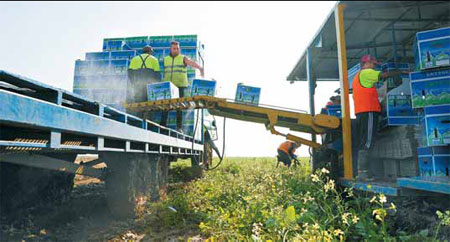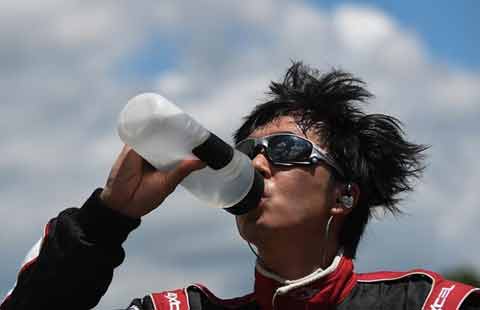FTA on the way down under
By Ding Qingfen (China Daily) Updated: 2012-06-08 08:15
|
Boxes of produce being loaded onto a truck at a farm near Werribee, Australia. While agricultural exports to China are increasing rapidly, the volume is small compared with the size of the Chinese market, said Kevin Rudd, a former prime minister of Australia. Carla Gottgens / Bloomberg |
The China-Australia free trade agreement is expected to be signed this year, which will create benefits for both countries, said Kevin Rudd, a member of Australia's parliament.
"(What) I would like to do is see the deal signed this year, the 40th anniversary of the China-Australia diplomatic relationship," said Rudd, calling it a "good way to have a birthday party".
Rudd, who is also a former prime minister of Australia, spoke with China Daily on the sidelines of the 2012 APEC China CEO Forum on Thursday.
Bilateral talks on an FTA began in May 2005. This March, the 18th round of talks was held in Australia.
"It's too long, and both sides have recognized that," said Rudd. "I believe that because China is the second-largest economy in the world, and the largest in Asia, and Australia is the fourth-largest in Asia, we should overcome the relatively minor differences."
He added: "What we will produce as a result will be bigger than anything we imagine."
Estimates from Australia are that a bilateral FTA would help generate additional revenues of A$146 billion ($145.5 billion) for the country in the next two decades.
"China's concern is about Australia's agriculture, and China thinks we are a big agriculture country", and the opening of the market would harm Chinese interests, "but frankly, I don't believe the argument is accurate", said Rudd.
He said that "Australian agriculture exports, by Chinese domestic standards, are quite small, and therefore, the ability for Australian agriculture to disrupt the Chinese market is very, very limited".
The benefit is the "FTA will liberalize the investment relationship between China and Australia, and (mean a) much larger flow of investment and capital from China to Australia as well".
Early this year, Premier Wen Jiabao said in the annual government work report that China will further pursue FTA negotiations with countries including Australia.
China is Australia's largest commodity trade partner, and Australia is China's eighth-largest trade partner.
Australia is also China's single largest fund and investment destination worldwide.
"If we have a free trade agreement, I believe we can take a $100-billion plus relationship and turn it into something bigger again," said Rudd. "It's good for China, and good for us, and more jobs for either side."
China is facing the risk of a further economic slowdown, which many fear will hurt the economy of Australia, also the largest supplier of iron ore for China.
Rudd disagreed. "Our assumption is that the Chinese economy still grows at a rate of as high as 7.5 percent, or probably 8 percent, and it is the case that demand for commodities will still be significant," he said.
On the other hand, the resources sector is not a "dominant" sector in Australia's economy, representing less than 9 percent of the economy.
"From China's point of view, they often look at Australia, I think they would say: "a big quarry, a big mine," he said.
But "from our point of view, yes, mining is important", but the "main drivers of growth in Australia" are sectors including manufacturing and services.
"Through free trade with China we grow all these sectors."
dingqingfen@chinadaily.com.cn
- Experts mixed on CDR proposals
- Stocks in big advance as Brexit odds wane
- Brookfield and China Three Gorges said to bid for Duke plants
- Supercell purchase to aid Tencent's globalization
- Chances high for more patent cases involving Apple
- Chinese car renters need detailed guidance abroad
- China to become largest market of high-net-worth individuals
- PowerChina sees future in Morocco



















